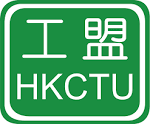 Organized labor came out in solidarity with Hong Kong pro-democracy campaigners this week, as the International Trade Union Confederation called on the European Union to lead the way in ensuring that human rights are eroded no further in the region, amid greater political pressure from Beijing, EURACTIV reports.
Organized labor came out in solidarity with Hong Kong pro-democracy campaigners this week, as the International Trade Union Confederation called on the European Union to lead the way in ensuring that human rights are eroded no further in the region, amid greater political pressure from Beijing, EURACTIV reports.
The call came a week after the Hong Kong Confederation of Trade Unions organized support for 20 Cathay Pacific airline employees dismissed or forced to resign, including pilots, cabin crew, ground staff and managers.
The HKCTU called the firing of Rebecca Sy, the Cathay Dragon union head, a “blatant suppression and retaliation on her participation in the anti-extradition bill movement and her actions to mobilize her colleagues to participate as a trade union leader.”
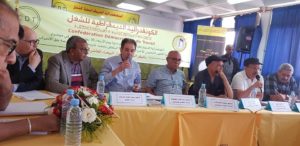
Solidarity Center
There is power in a union – as recent protests in Morocco (right) attest – but scant union power in the United States, says analyst Eric Levitz:
Last year, America’s unionization rate fell to a new historic low of 10.5 percent. Among private-sector workers, it was a piddling 6.4 percent. Government workers’ resilient organizing has long kept the broader labor movement off of life support. But in 2018, the Supreme Court’s conservative majority gutted the capacity of such workers to collect union dues. Now, the public-sector unionization rate is falling faster than the private one — and organized labor is losing the class war in a rout.
And yet, the labor movement is simultaneously winning the “war of ideas,” he writes for New York magazine.
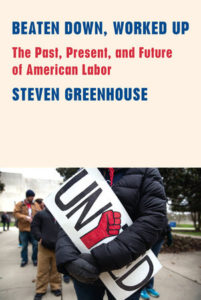 Unions have helped create a fairer, more democratic nation: lifting millions of workers and giving average, non-affluent Americans a greater voice in politics, says former New York Times journalist Steven Greenhouse, author of the new book, “Beaten Down, Worked Up: The Past, Present, and Future of American Labor.”
Unions have helped create a fairer, more democratic nation: lifting millions of workers and giving average, non-affluent Americans a greater voice in politics, says former New York Times journalist Steven Greenhouse, author of the new book, “Beaten Down, Worked Up: The Past, Present, and Future of American Labor.”
As the philosopher Sidney Hook observed, “democracy is not merely a political concept but a moral one. It is democracy as a way of life.” As such, it extends beyond the political arena to all walks of life, including the workplace. Labor unions are often a country’s largest, most representative civil society groups, with a membership base that adds democratic credentials and legitimacy that most NGOs can only envy.
Labor unions have played a pivotal role in democratic transitions, in South Korea, South Africa and Poland. Workers and trade unions were often among the earliest and most energetic demonstrators in African states experiencing democratic protests, Jon Kraus writes in Trade Unions in Africa’s Democratic Renewal and Transitions.
Labor unions have always been not only political advocates for working people — union and non-union alike, argues Peter Cole, a Professor of History at Western Illinois University and a Research Associate at the Society, Work and Development Institute at the University of the Witwatersrand in South Africa. Organized labor also provides a check or countervailing power against corporate or other special interests capturing and corrupting democracy, he writes for TIME magazine.
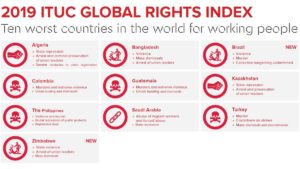 Robust trade unionism was once considered an essential underpinning of democracy, John Nichols writes for The Nation:
Robust trade unionism was once considered an essential underpinning of democracy, John Nichols writes for The Nation:
In the immediate aftermath of World War II, Americans preached from a gospel that understood labor rights as human rights. During the postwar occupation of Japan, General Douglas MacArthur and his aides worked with Japanese citizens to draft a Constitution that would serve as a framework for democracy. Fully aware that strong independent unions provide a defense against authoritarianism, they included language that explicitly announced that “the right of workers to organize and to bargain and act collectively is guaranteed.”
The US used to tell the world that strong unions were a bulwark against fascism. We should take our own advice and enshrine the right to organize, Nichols argues.
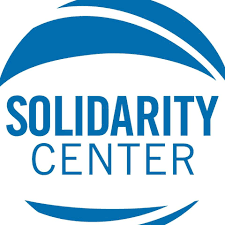 Major trends and disruptions are altering the world around us. Threats to human rights and labor rights defenders, closing civic space, automation’s impact on the future of work, and the underlying conditions leading to the #MeToo movement are real challenges to ensuring a fair global economy that works for everyone. However, against these threats there are significant efforts underway to build power, set standards, and ultimately to ensure economic and social justice in communities across the world, notes the Solidarity Center, a core institute of the National Endowment for Democracy:
Major trends and disruptions are altering the world around us. Threats to human rights and labor rights defenders, closing civic space, automation’s impact on the future of work, and the underlying conditions leading to the #MeToo movement are real challenges to ensuring a fair global economy that works for everyone. However, against these threats there are significant efforts underway to build power, set standards, and ultimately to ensure economic and social justice in communities across the world, notes the Solidarity Center, a core institute of the National Endowment for Democracy:
At the front lines of this fight are incredible women who are paving the way for reforms in law, policy and practice. These leaders understand that to truly course correct we need to build power and work in collaboration. This event will both celebrate their achievements and reflect on what has worked—and what needs more support—in the fight for justice, democracy, and fair work for all.
The Solidarity Center, Open Society Foundations, Ford Foundation, Freedom Fund, Fundación Avina, C&A Foundation, Humanity United, AFL-CIO and Global Labor Justice invite you to ….
Building Power: Women’s Leadership in the Fight for Justice, Democracy and Fair Work, in New York City on Tuesday, September 24, 2019 from 3 p.m. – 5 p.m. [RSVP here.]
- Sharan Burrow is the General Secretary of the International Trade Union Confederation and a former president of the Australian Council of Trade Unions. She is the first woman to become General Secretary of the ITUC since its founding in 2006 and was the second woman to become president of the ACTU.
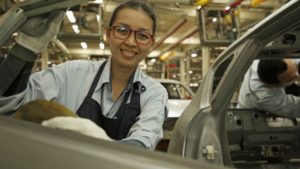
Solidarity Center
- Liz Shuler is a U.S. labor activist and, since 2009, Secretary-Treasurer of the AFL-CIO. She is the first woman and the youngest person to hold the position of Secretary-Treasurer and is the highest-ranking woman in the labor federation’s history.
- Anannya Bhattacharjee is the International Coordinator of Asia Floor Wage Alliance, a global supply chain campaign for living wages and a violence-free workplace for garment workers in Asia who are mostly women and who produce most of the world’s clothing. She is one of the few women trade unionists in India and has helped build grassroots labor-related collaboration between North America, Europe and Asia for well over a decade.
- Maricarmen Molina is the General Secretary of the Confederación Sindical de Trabajadores y Trabajadoras de El Salvador – CSTS, one of the largest trade union confederations in El Salvador.
- Libakiso Matlho is National Director at Women and Law in Southern Africa Research and Education Trust – Lesotho (WLSA), former Lecturer at National University of Lesotho and renowned human rights and women’s rights scholar and gender activist.
- Rose Omamo is General Secretary of the Amalgamated Union of Kenya Metal Workers, National Chair and Executive Board Member of the Central Organization of Trade Unions-Kenya (COTU-K) Women’s Committee, a member of Organization of African Trade Union Unity and member of ITUC Africa Women’s Committee.
RSVP
Date: September 24, 2019
Time: 3 p.m. – 5 p.m.
Location: Murphy Institute (CUNY School of Labor and Urban Studies), 25 West 43rd Street, 18th Floor, New York, NY 10036







